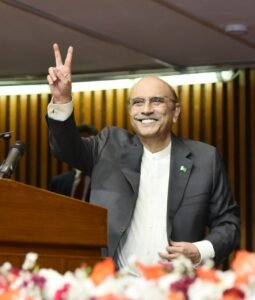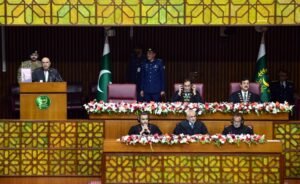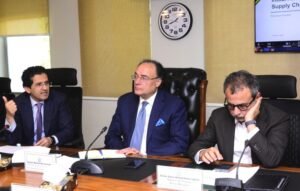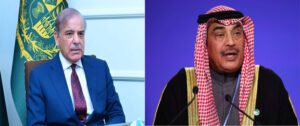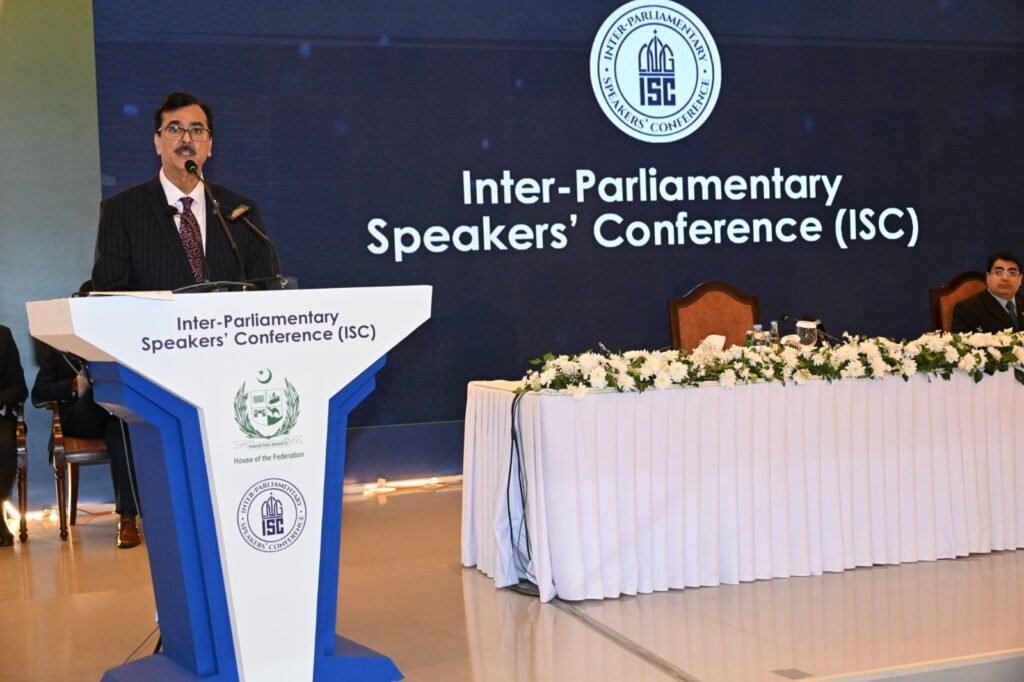
Islamabad : Inter-Parliamentary Speakers’ Conference concludes, adopts Islamabad Communique
Gilani terms terrorism a global threat, joint strategies must to overcome the menace,
Chairman Senate Syed Yousaf Raza Gilani while addressing the closing session of Inter-Parliamentary Speakers Conference (ISC) observed that terrorism remains one of the gravest global threat and its elimination requires not only military measures but also parliamentary cooperation, financial oversight, and collective political will. He condemned the recent terrorist attacks in Islamabad and Wana. “The Chairman also highlighted the necessity of “joint strategies, mutual collaboration, and coordinated global action”. He highlighted the tremendous sacrifice of Pakistan in the fight against terrorism. “Terrorists have no religion or nation; they are enemies of humanity” said the Chairman Senate.
Gilani reaffirmed Pakistan’s commitment to stand firmly for “global peace, stability, and dialogue, with parliaments playing a pivotal role in promoting understanding and cooperation”.
Chairman Senate while highlighting the common global challenge of Climate Change emphasized that “accelerating pace of climate change poses a genuine threat to human survival” and called for collective global strategy to deal with the contemporary global challenges of “terrorism, extremism, climate change, and humanitarian crises”. He called “parliaments as drivers of global action” and key drivers for cooperation, through international collaboration.
Chairman Senate also presented the Islamabad Communique which was jointly adopted.
The text of the Islamabad Communique is as under:
ISLAMABAD COMMUNIQUÉ
Preamble
We, the Speakers of Parliaments convened in Islamabad for the Inter-Parliamentary Speakers’ Conference (ISC), from November 10–12, reaffirm our shared commitment to the foundational principles of peace, security, and inclusive development as enshrined in the Charter of the United Nations and the universally recognised principles of international law.
We take cognizance of the ever-growing complexities in the world today. We firmly believe that parliaments have a vital role in addressing common challenges by fostering inclusive dialogue, legislative innovation, interregional connectivity and parliamentary diplomacy. Building upon ISC’s foundational vision of global unity, peace, and shared prosperity, we further recognize the urgent need for collective parliamentary action to address all interconnected challenges and materialize shared opportunities for the well-being of our peoples.
Declarations
- Reaffirming the ISC Mandate and Parliamentary Diplomacy
Recognize the Inter-Parliamentary Speakers’ Conference (ISC) as a crucial platform for meaningful parliamentary dialogue and exchanges, as well as capacity-building of parliamentarians.
Resolve to augment inter-parliamentary cooperation through MoUs, joint committees, parliamentarians’ caucuses, special forums for young parliamentarians, institutionalized partnerships, and promotion of mutual understanding across diverse regions and political systems.
Commit to supporting the ISC as a valuable forum for dialogue and the exchange of best practices among parliaments, to address complex transnational issues, including sustainable development, climate resilience, conflict resolution, water, food and health security, while amplifying the voices of emerging economies to ensure equitable representation in shaping global cooperation.
Underscore the critical role of parliamentary diplomacy in bridging divides, preventing conflict, fostering people-centric development, and reinforcing multilateralism as the foundation for a more just and peaceful international order. - Ensuring Peace through Dialogue and Cooperation
Emphasize that sustainable development is unattainable without enduring peace, and that peace itself cannot be realized without justice, equality, and inclusive and sustainable socio-economic growth that leaves no one behind.
Affirm the vital role of parliaments in upholding the principles of international law, advancing human rights, and supporting the legitimate aspirations of all peoples to live in security, dignity, and freedom.
Endorse parliamentary initiatives that promote the peaceful resolution of longstanding disputes, reinforce the rule of law, and prioritize dialogue over unilateralism, accord over discord, and partnership over conflict.
Promote reconciliation, mediation, and proactive parliamentary diplomacy, as essential tools for building trust, bridging political and cultural divides, and de-escalating tensions.
Encourage stronger inter-parliamentary cooperation to tackle the underlying drivers of instability — such as poverty, exclusion, climate stress and protracted regional disputes — through dialogue, consensus-building, and sustainable development approaches that uphold stability, equity, and mutual respect among nations. - Advancing Equitable and Sustainable Development
Commit to legislating and monitoring national and regional development agendas aligned with the 2030 Sustainable Development Goals (SDGs) that effectively bridge social and economic inequalities.
Contribute to the economic and social empowerment of vulnerable and underserved communities with a particular focus on women, youth, differently abled persons and those in underdeveloped regions.
Support inclusive and forward-looking development agendas that are climate-resilient, environmentally sustainable, and driven by equitable access to innovation, technology, and digital infrastructure.
Strive to close the digital divide and leverage innovation to improve public service delivery and economic inclusion.
Promote national and international e-parliament platforms that enable secure, real-time digital engagement with citizens, and develop AI governance frameworks grounded in principles of fairness, transparency and accountability, ensuring that technological advancement serves the well-being of all our peoples and respects fundamental rights.
Prioritize institutional capacity-building within parliaments to strengthen legislative oversight, role of parliamentary caucuses, special and standing committees in ensuring transparency, inclusion and accountability in development processes, and upholding principles of responsible, participatory, and people-centered governance. - Combating Global Threats through Collective Parliamentary Action
Recognize the urgency of addressing global challenges, including terrorism and extremism, climate change, food and water insecurity, poverty, pandemics, cyber security, hate speech, xenophobia, Islamophobia, through enhanced bilateral and multilateral cooperation, inclusive international partnerships, and multi-stakeholder mediation approaches that give primacy to citizens’ protection and human security.
Promote policies that advocate fair, equitable, adequate and accessible climate financing, in line with the principle of Common But Differentiated Responsibilities and Respective Capabilities (CBDR-RC), addressing inflation and debt crises in developing countries, and ensuring that no nation is left behind in the pursuit of global resilience and progress.
Promote sustained investment in education, scientific research, and innovation as critical pillars for building knowledge-based, adaptive, and resilient societies capable of withstanding current and future crises. - Fostering Regional Stability and Integration
Emphasize the need to promote inclusive, transparent, and mutually beneficial infrastructure and connectivity initiatives that foster regional cohesion, enhance people-to-people exchanges, and contribute to collective prosperity.
Encourage national parliaments to lead in crafting trust-building measures, harmonizing legal frameworks, and fostering inter-parliamentary cooperation to defuse tensions, deepen mutual respect, and support long-term stability across regions.
Reaffirm the value of parliamentary diplomacy, dialogue and non-interference in the internal affairs of States as cornerstones of peaceful coexistence and regional development.
Conclusion
As we close the inaugural meeting of this august forum and adopt the historic Islamabad Communiqué on 12th November 2025, we look toward a future where parliaments lead from the front, inspiring action, building trust, and deepening cooperation. We shall be guided by the enduring principles enshrined in the United Nations Charter, and the Universal Declaration of Human Rights. We reaffirm our collective responsibility to uphold peace, advance security, and foster sustainable development to build a world that is just, inclusive, and prosperous for all.



